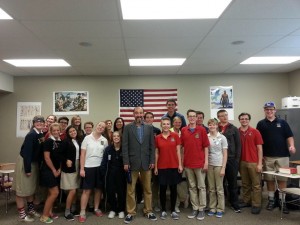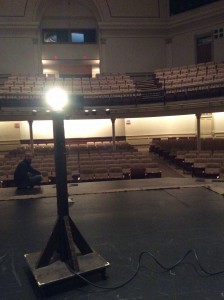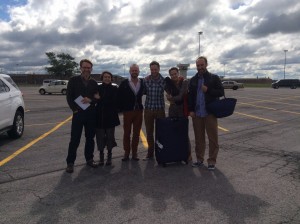Over the next 24 hours, via trains, planes, and automobiles, our five “Actors From The London Stage” are making their way from England to their US home at the University of Notre Dame. After a final few days of tweaks and tech, they’ll set out to campuses across the country to tour their AFTLS production of Shakespeare’s MACBETH. But, before they begin to bring you their notes from the road, we’d like to make some introductions. With “much ado,” Shakespeare at Notre Dame presents the Spring 2015 touring cast of Actors From The London Stage:
 ANNIE ALDINGTON (Donalbain/Ross/Menteth/Fleance/Lady Macbeth/Third Witch) studied drama at the University of Northumbria and works as an actor and voiceover artist. Recent theatre credits include: Mistress Quickly, Henry V (Shakespeare’s Globe); The Nurse, Romeo and Juliet (Globe Education); Eileen, Regarding X (Hot August Comedy Fringe); and Julie, A Certain Minor Light (Wimbledon Theatre). Annie is also a sonneteer at Shakespeare’s Globe and was a 2012 cast member in ‘Pop up Shakespeare,’ a project set up by Mark Rylance and directed by Jonathan Moore. This was a 50 strong cast taking Shakespeare out onto the streets of London. Annie’s recent film credits include: Sandra, Flinch (Iblade Films); and Dr. Adele Smith, English Wine (FFP Media, Germany). Annie has also recorded around 300 audio books and is the voice of many London based authors, including Martina Cole and Roberta Kray. Annie founded ‘Actup’ Theatre school in 2007 for children aged 7-12 years and also tours and workshops a play about Queen Victoria, called Victoria And Me to schools in London.
ANNIE ALDINGTON (Donalbain/Ross/Menteth/Fleance/Lady Macbeth/Third Witch) studied drama at the University of Northumbria and works as an actor and voiceover artist. Recent theatre credits include: Mistress Quickly, Henry V (Shakespeare’s Globe); The Nurse, Romeo and Juliet (Globe Education); Eileen, Regarding X (Hot August Comedy Fringe); and Julie, A Certain Minor Light (Wimbledon Theatre). Annie is also a sonneteer at Shakespeare’s Globe and was a 2012 cast member in ‘Pop up Shakespeare,’ a project set up by Mark Rylance and directed by Jonathan Moore. This was a 50 strong cast taking Shakespeare out onto the streets of London. Annie’s recent film credits include: Sandra, Flinch (Iblade Films); and Dr. Adele Smith, English Wine (FFP Media, Germany). Annie has also recorded around 300 audio books and is the voice of many London based authors, including Martina Cole and Roberta Kray. Annie founded ‘Actup’ Theatre school in 2007 for children aged 7-12 years and also tours and workshops a play about Queen Victoria, called Victoria And Me to schools in London.
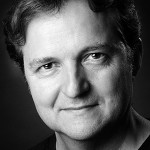 CHARLES ARMSTRONG (Duncan – King Of Scotland/Macduff/Angus/Second Witch/Murderer) is an AFTLS veteran who trained at the Drama Studio London after studying French and Philosophy at Oxford University. Theatre credits include: Witness for the Prosecution and Engaging Shaw (Vienna’s English Theatre), Stop Messing About (Leicester Square Theatre and Number 1 Tour), Round The Horne Revisited (West End and Number 1 Tour), Wake Up and Smell The Coffee (New End), The Two Gentlemen Of Verona (Royal Shakespeare Company), Trelawny Of The Wells and The Soldiers (National Theatre), Of Mice and Men (Harrogate Theatre), The Tenant Of Wildfell Hall (Salisbury Playhouse), Wait Until Dark (Royal Theatre, Northampton), Bless The Bride (King’s Head), Twelfth Night (Liverpool Playhouse), Peter Pan (Northcott, Exeter), Rebecca (Number 1 Tour), Hay Fever (Jersey Opera House), The Provok’d Wife and The Provok’d Husband (New End), Henry V (Union Theatre), Othello (Cochrane Theatre & Tour), and How He Lied To Her Husband (Orange Tree). Film credits include: The King’s Speech, The Spell, The Pharmacist, The Navigators, The Ultimate Truth, and On The Other Hand. Television credits include: Call The Midwife, Doctors, Holby City, Scoop, Round The Horne Revisited, Head Over Heels, EastEnders, Poirot, The Hello Girls, Futurecast, and Strictly Chuckle. Radio credits include Changeable and Twice Ken Is Plenty (Radio 4). Charles was on the BBC’s Radio Repertory Company and has recorded numerous voiceovers. Charles has taught Acting Workshops for Act Up and directed theatre productions for Theatre Clwyd and the London Sitcom Trials.
CHARLES ARMSTRONG (Duncan – King Of Scotland/Macduff/Angus/Second Witch/Murderer) is an AFTLS veteran who trained at the Drama Studio London after studying French and Philosophy at Oxford University. Theatre credits include: Witness for the Prosecution and Engaging Shaw (Vienna’s English Theatre), Stop Messing About (Leicester Square Theatre and Number 1 Tour), Round The Horne Revisited (West End and Number 1 Tour), Wake Up and Smell The Coffee (New End), The Two Gentlemen Of Verona (Royal Shakespeare Company), Trelawny Of The Wells and The Soldiers (National Theatre), Of Mice and Men (Harrogate Theatre), The Tenant Of Wildfell Hall (Salisbury Playhouse), Wait Until Dark (Royal Theatre, Northampton), Bless The Bride (King’s Head), Twelfth Night (Liverpool Playhouse), Peter Pan (Northcott, Exeter), Rebecca (Number 1 Tour), Hay Fever (Jersey Opera House), The Provok’d Wife and The Provok’d Husband (New End), Henry V (Union Theatre), Othello (Cochrane Theatre & Tour), and How He Lied To Her Husband (Orange Tree). Film credits include: The King’s Speech, The Spell, The Pharmacist, The Navigators, The Ultimate Truth, and On The Other Hand. Television credits include: Call The Midwife, Doctors, Holby City, Scoop, Round The Horne Revisited, Head Over Heels, EastEnders, Poirot, The Hello Girls, Futurecast, and Strictly Chuckle. Radio credits include Changeable and Twice Ken Is Plenty (Radio 4). Charles was on the BBC’s Radio Repertory Company and has recorded numerous voiceovers. Charles has taught Acting Workshops for Act Up and directed theatre productions for Theatre Clwyd and the London Sitcom Trials.
 JOANNA BENDING (Bloody Soldier/Old Man/Malcolm/Cathness/Lady Macduff/First Witch/Murderer/Gentlewoman) trained at The Royal Academy of Dramatic Art. In theatre she has most recently appeared as Eleanor Hopkirk alongside Alan Cox in Kingmaker, which transferred to the St. James Theatre in London after its sell out Edinburgh run this summer. Earlier in the year, she played Connie in Under the Mulberry Tree (Festival Theatre Edinburgh) and Emily, an Alzheimer’s sufferer, in Hand Over Fist (Seabright Productions and the Comedians’ Theatre Company) for which she was nominated as Best Solo Performer by The Stage in 2012. Other career highlights include spending a year at the National Theatre in The Prime of Miss Jean Brodie, appearing at the Royal Court in Pinter’s Mountain Language, at Regents Park in Two Women for One Ghost, and Carl Djerassi’s play, Phallacy, at the Kings Head. Joanna also enjoyed a summer season of weekly rep at Frinton playing Ruth in Blithe Spirit and all the female characters in Intimate Exchanges. For television, she has appeared in Doctors (many times in different guises), Holby City, Eastenders, Coronation Street, The Sarah Jane Adventures, Love Soup, The Bill, Angel of Death: the Beverley Allitt Story, and PMTV for the Paramount Comedy Channel. Films include this year’s Second Coming, the first feature from acclaimed playwright Debbie Tucker-Green, (Hillbilly Films); and Tick Tock Lullaby (Valiant Doll), which won Best Feature Award at the Britspotting British & Irish Film Festival.
JOANNA BENDING (Bloody Soldier/Old Man/Malcolm/Cathness/Lady Macduff/First Witch/Murderer/Gentlewoman) trained at The Royal Academy of Dramatic Art. In theatre she has most recently appeared as Eleanor Hopkirk alongside Alan Cox in Kingmaker, which transferred to the St. James Theatre in London after its sell out Edinburgh run this summer. Earlier in the year, she played Connie in Under the Mulberry Tree (Festival Theatre Edinburgh) and Emily, an Alzheimer’s sufferer, in Hand Over Fist (Seabright Productions and the Comedians’ Theatre Company) for which she was nominated as Best Solo Performer by The Stage in 2012. Other career highlights include spending a year at the National Theatre in The Prime of Miss Jean Brodie, appearing at the Royal Court in Pinter’s Mountain Language, at Regents Park in Two Women for One Ghost, and Carl Djerassi’s play, Phallacy, at the Kings Head. Joanna also enjoyed a summer season of weekly rep at Frinton playing Ruth in Blithe Spirit and all the female characters in Intimate Exchanges. For television, she has appeared in Doctors (many times in different guises), Holby City, Eastenders, Coronation Street, The Sarah Jane Adventures, Love Soup, The Bill, Angel of Death: the Beverley Allitt Story, and PMTV for the Paramount Comedy Channel. Films include this year’s Second Coming, the first feature from acclaimed playwright Debbie Tucker-Green, (Hillbilly Films); and Tick Tock Lullaby (Valiant Doll), which won Best Feature Award at the Britspotting British & Irish Film Festival.
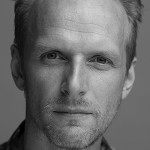 MICHAEL PALMER (Macbeth/English Doctor/Murderer) teaches Drama at the Sylvia Young Theatre School, London. His theatre credits include: All Creatures Great and Small (UK tour, Bill Kenwright Ltd); The Butterfly Lion (UK tour, BKL); The Merchant of Venice playing Shylock and Twelfth Night playing Malvolio and Sir Andrew Aguecheek (Actors From The London Stage); Dr. Jekyll and Mr. Hyde (one man show, Creation TC, Oxford UK); Friend or Foe by Michael Murpogo (UK tour); A Doll’s House (Cambridge, UK); the title role in Volpone (Wilton’s Music Hall, London); The Country Wife at the Bridewell; Hamlet, King Lear, and The Merchant of Venice for Compass Theatre Company; Gamblers at Battersea Arts Centre; Descent: The Diary of a Madman (one man show, Edinburgh festival); The Mysteries at the Orange Tree in Richmond; Breaking the Code, As You Like It, and The Real Thing in Basingstoke. He also has recorded numerous Shakespeare plays on CD. Musicals include tours of Footloose; The Wedding Singer; Sing-along-a-Abba; Company at Westcliffe, UK; and the title role in Did You, Dr Crippen? at the Trafalgar Studios, London. On television Michael has appeared in Bear Behaving Badly, How Not to Live Your Life, Waking the Dead, Casualty, and Wish Me Luck.
MICHAEL PALMER (Macbeth/English Doctor/Murderer) teaches Drama at the Sylvia Young Theatre School, London. His theatre credits include: All Creatures Great and Small (UK tour, Bill Kenwright Ltd); The Butterfly Lion (UK tour, BKL); The Merchant of Venice playing Shylock and Twelfth Night playing Malvolio and Sir Andrew Aguecheek (Actors From The London Stage); Dr. Jekyll and Mr. Hyde (one man show, Creation TC, Oxford UK); Friend or Foe by Michael Murpogo (UK tour); A Doll’s House (Cambridge, UK); the title role in Volpone (Wilton’s Music Hall, London); The Country Wife at the Bridewell; Hamlet, King Lear, and The Merchant of Venice for Compass Theatre Company; Gamblers at Battersea Arts Centre; Descent: The Diary of a Madman (one man show, Edinburgh festival); The Mysteries at the Orange Tree in Richmond; Breaking the Code, As You Like It, and The Real Thing in Basingstoke. He also has recorded numerous Shakespeare plays on CD. Musicals include tours of Footloose; The Wedding Singer; Sing-along-a-Abba; Company at Westcliffe, UK; and the title role in Did You, Dr Crippen? at the Trafalgar Studios, London. On television Michael has appeared in Bear Behaving Badly, How Not to Live Your Life, Waking the Dead, Casualty, and Wish Me Luck.
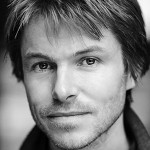 BEN WARWICK (Banquo/Lennox/Seyward/Son Of Macduff/Scottish Doctor/Porter/Hecate) trained in acting at The Guildhall School of Music and Drama having previously studied English Literature at The University of Glasgow. He has worked in British theatre, film, and television for 14 years. Notable theatre credits on London’s West End include Hamlet, the British premier of Athol Fugard’s The Captain’s Tiger, Pentecost, Look Back In Anger, Great Expectations, Miss Julie and The Deep Blue Sea. He played the lead in the highly acclaimed The Trench with Les Enfants Terribles theatre company (Edinburgh Festival and national tour). He has toured Russia as Constantin in The Seagull, Sweden as the lead in Cock by Mike Bartlett, and Italy as the lead in a radical adaptation of The Picture of Dorian Gray. Other theatre includes seasons at Theatre Royal York, Royal Northampton, The Orange Tree, and Watford Palace. Ben has also been co-artistic director of Farnham Repertory Theatre for the last nine years. In 2008, he created and directed the online TV series Five Years that went on to be a finalist in its category at the prestigious Vimeo Awards in New York. TV credits include Mary Queen of Scots (BBC) and feature film work including Blood Moon and Canakkale Yolun Sonu. Ben will also be the tour’s blogger.
BEN WARWICK (Banquo/Lennox/Seyward/Son Of Macduff/Scottish Doctor/Porter/Hecate) trained in acting at The Guildhall School of Music and Drama having previously studied English Literature at The University of Glasgow. He has worked in British theatre, film, and television for 14 years. Notable theatre credits on London’s West End include Hamlet, the British premier of Athol Fugard’s The Captain’s Tiger, Pentecost, Look Back In Anger, Great Expectations, Miss Julie and The Deep Blue Sea. He played the lead in the highly acclaimed The Trench with Les Enfants Terribles theatre company (Edinburgh Festival and national tour). He has toured Russia as Constantin in The Seagull, Sweden as the lead in Cock by Mike Bartlett, and Italy as the lead in a radical adaptation of The Picture of Dorian Gray. Other theatre includes seasons at Theatre Royal York, Royal Northampton, The Orange Tree, and Watford Palace. Ben has also been co-artistic director of Farnham Repertory Theatre for the last nine years. In 2008, he created and directed the online TV series Five Years that went on to be a finalist in its category at the prestigious Vimeo Awards in New York. TV credits include Mary Queen of Scots (BBC) and feature film work including Blood Moon and Canakkale Yolun Sonu. Ben will also be the tour’s blogger.
Welcome to Annie, Charles, Joanna, Michael, and Ben. As Southie Shakespeare might say, “something wicked awesome this way comes!”

